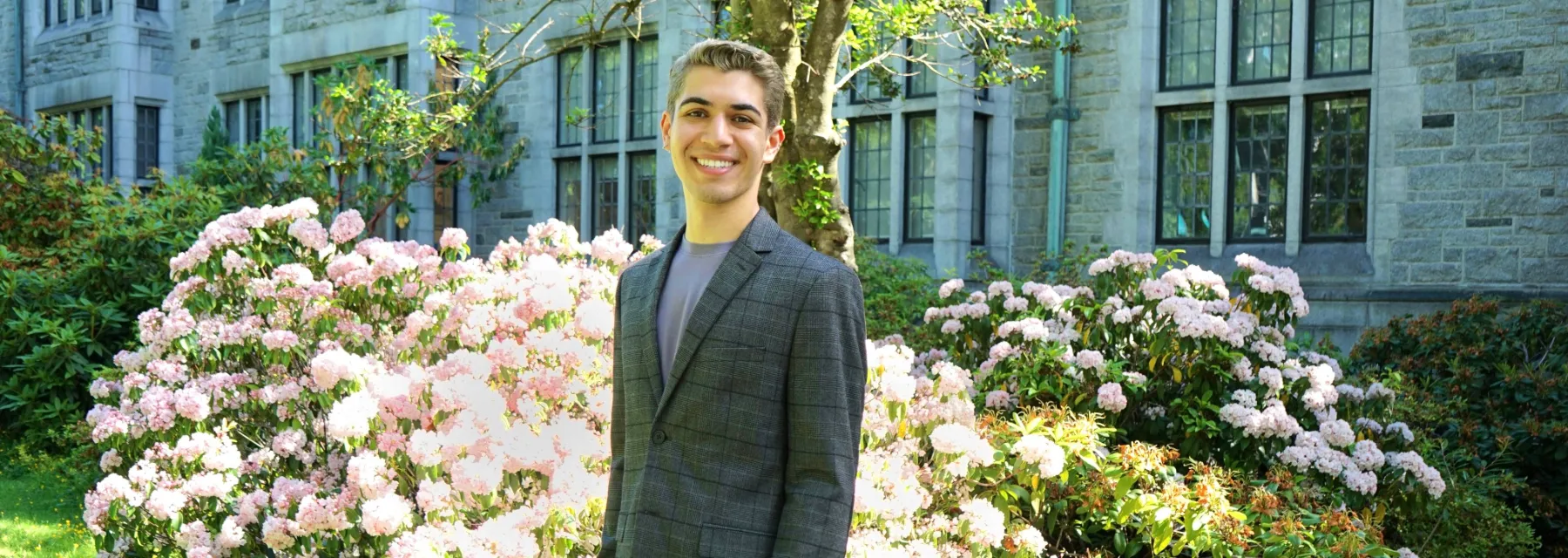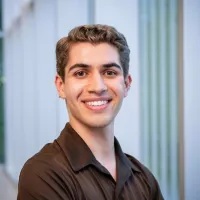
Max Ahluwalia
MDS Computational Linguistics, Class of 2024
During Max Ahluwalia’s time completing his Bachelor of Science in Cognitive Systems at UBC, he spent one year abroad at Leiden University in the Netherlands. It was during this time that Ahluwalia was introduced to many topics in computational linguistics and data science, including text mining, data visualizations, database creation, and formal modelling.
“The crossroads of these two fields began my passion for computational models of language,
and I later continued this after I returned to Canada to finish my degree,” explained Ahluwalia.
When Ahluwalia returned to UBC, he found himself taking more data science and linguistic-focused courses and started working at the Speech in Context Lab on campus.
Max Ahluwalia decided to pursue a Master’s in Computational Linguistics because he recognized the significant value of preserving languages. He believes that languages are essential for maintaining cultural and political identities and serve as the culmination of entire societies' histories and traditions. By pursuing a degree in Computational Linguistics, he aimed to contribute to the preservation and revitalization of these necessary elements of human heritage.
“The preservation of languages is vital in understanding the history and knowledge of a people,
otherwise, the extinction of a language is indeed a tragedy as the story, our story, is lost. Now, technology provides us with the opportunity to protect the loss of languages and speakers through lasting, digital models,” he added.
Ahluwalia decided to apply to UBC’s Master of Data Science (MDS) Computational Linguistics program because he saw it as a natural progression for him to solve language-based problems using computational methodologies.
To help prepare him for the MDS Computational Linguistics program, Ahluwalia followed courses on linguistic theory and took refresher courses on the fundamentals of linguistics, computer programming, statistics, and linear algebra, which he found extremely comprehensive and relevant to the coursework of the program. “Since the program moves quite quickly, it was extremely helpful for me to go through the refresher courses since they caught me back up to speed on several concepts I haven’t worked with in a few years.”
In addition, Ahluwalia familiarized himself with tools and technologies commonly used in the field, such as Python, SQL, and data visualization libraries.
As he dove into the program, Ahluwalia discovered that one of the aspects he was most appreciative of the MDS Computational Linguistics program was the diversity of backgrounds among the cohort. Working alongside these highly driven individuals with diverse professional and educational perspectives created a supportive learning environment where we all thrived by sharing our knowledge with each other.
“The program is structured to support students from diverse academic backgrounds, so if you have a particular interest in computational linguistics and data science, it’s definitely worth applying. The hands-on projects, comprehensive coursework, and supportive community will provide you with a rich and rewarding educational experience, setting you up for a successful career in the field.”
Another important factor for Ahluwalia in choosing the MDS Computational Linguistics program was the capstone project.
“It provided a valuable opportunity to apply my knowledge and skills in a real-world setting. As a professional degree, the capstone perfectly combined academic learning with practical application, allowing us to use what we had learned in a professional context,” he explained.
As Ahluwalia completes the MDS Computational Linguistics program, he feels confident that the program has prepared him for the job market not only through its curriculum and capstone project but also through various workshops, seminars, and career talks.
“I had the chance to connect with industry professionals, alumni, and recruiters. These networking opportunities have been advantageous for me in building relationships that can lead to job opportunities,” he said.
Ahluwalia is seeking roles focused on working with low-resource languages, machine translation, or developing educational tools. “Jobs that involve building NLP models and tools for low-resource languages allow me to apply my computational linguistics skills to make a meaningful impact in this area.”
Max’s Top 3 Tips on Succeeding in the MDS Computational Linguistics Program:
- Do everything with intention: Being here is already an incredible achievement. Make the
most of the resources available to you, complete your work, and ask questions that reflect your genuine curiosity and eagerness to learn about data science and computational linguistics. - You were selected for a reason: This program is challenging and demands great discipline, but it is also incredibly rewarding and transformative. Embrace the rigorous coursework and opportunities as they will prepare you with the skills and knowledge to excel.
- Take time for yourself: While this program is very intensive and often requires long hours, it’s essential to still exercise, eat healthy, and socialize outside of class! Take the time to enjoy your overall experience and well-being by exploring nature, cultural events, and recreational activities in the beautiful city of Vancouver.
